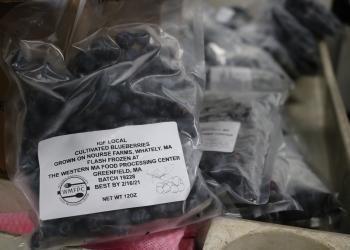There is an opportunity for farmers to meet growing demand for local foods and increase farm profitability by entering a new market for retail sales of frozen value-added products. In particular, farmers could capitalize on opportunities provided by recent investments in regional food processing facilities by freezing produce for retail sales in winter. Like many new marketing opportunities, farmers do not have access to information they need to determine profitability in the new market: whether the returns from processing and selling retail frozen produce are greater than the costs or producing safe, high-quality food products that meet food safety regulations.
Farmers have indicated that they are interested in the market, but need better information on: processing/production costs; food safety/quality assurances; consumers’ demand/pricing; and packaging/marketing. Through this project we combine original research with existing supply-chain information provided by community partners to fill the information gap so farmers can determine whether this could be a profitable market for their operation. Specifically, through this work we aim to answer business questions such as: Can local and regional produce be profitably grown and processed (frozen) for off-season retail sales? Do consumers have higher willingness-to-pay for locally produced and processed frozen foods? And at what costs of producing safe, high-quality, locally grown, and processed frozen foods will not exceed consumers’ willingness-to-pay?
Project Goals and Objectives:
The goal of this project is to assess farmer profitability in the Northeast region from selling a new product, retail frozen local foods, by estimating key returns and costs, and profitability.
To do this, we:
- Estimate consumer demand for locally processed products;
- Develop non-proprietary standard operating procedures for two safe, high-quality, popular retail frozen fruit and vegetable products, and:
- Estimate processing/production costs using scale processing pilots and costs data from community partners.
This information fills the knowledge gap that hinders adoptability of retail frozen local sales in the Northeast.
Relevance:
We provide additional knowledge regarding local value-added production opportunities to Northeast farmers and other agricultural partners and service providers. This work helps to conduct important market research and product development to that help provide important tools for farmers to guide decision making in new markets.
Outputs & Extension Materials:
- Peer-reviewed article: Financial Feasibility of Selling Frozen Produce in Local and Regional Markets, July 2023
- Center for Agriculture, Food and the Environment article, August 2023
- Materials from the September 30, 2020 Webinar titled, “Freezing Produce for a New Market: Sharing the lessons learned from Determining New Market Channels for Local Producers”
- Slides presented- NESARE Freezing Webinar Workshop Outreach Sept302020
- Recording of the live webinar session- SARE Freezing for Retail
- Virtual production tour of the processing operation for frozen blueberries - NESARE Blueberry Production Video
- Photo library of the project - NESARE Freezing Photo Journal
- Fitzsimmons, J.F., Kinchla, A.J. Presentation titled, “New Frozen Products for a New Market: An Integrated Research-Extension Program Targeted Toward Determining New Market Channels for Local Producers”. New England Fruit, Vegetable & Berry Growers Association, Manchester, NH. December 2019.
- Fitzsimmons, J.F., Kinchla, A.J. Presentation titled, “New Frozen Products for a New Market: An Integrated Research-Extension Program Targeted Toward Determining New Market Channels for Local Producers”. CT NOFA Conference, CT. March 2020.
- Fitzsimmons, J.F., Presentation titled, “Consumers’ Perceptions of Food Safety in Markets for Local Food”. AAEA Annual Meeting, FNS/ FAMPS Track Session Presentation. Online August, 2020.
- UMass Project Spotlight - https://ag.umass.edu/news-events/highlights/got-local-fruit-veggies-in-your-freezer
- Research Summaries:
- Market research reporting from survey experiments – Coming soon. In process.
- Results from process optimization studies – Coming soon. In process.
- Technical support tools:
- Sample of a food safety plan for frozen blueberries following the Preventive Control Rule regulation– Frozen Blueberries Food Safety Plan Teaching Exercise
- Protocols used to evaluate frozen blueberries:
- Sample protocol for calculating drip loss- https://umass.app.box.com/folder/123323702544?s=6oylqbzix26bdgv1n6cejsum27hvswxv
- Sample protocol for calculating damaged berries: https://umass.app.box.com/folder/123323702544?s=6oylqbzix26bdgv1n6cejsum27hvswxv
- Sample protocol for conducting an environmental monitoring program- Sample of an Environmental Monitoring Protocol.pdf
- Calculating tools to determine the cost & returns of IQF frozen produce at the Western Mass Food Processing Center:
Sponsored Program:
This project was gratefully funded by the Northeast Sustainable Agriculture & Education Program (NESARE award, project number LNE 18-370) and the Massachusetts Agricultural Experiment Station, and the Food Science department of the University of Massachusetts Amherst, under project number MAS0040.
Acknowledgements:
We gratefully acknowledge the expertise and engagement contributed by the following project partners:
- Northeast SARE
- Western Mass Food Processing Center
- Simple Gifts Farm
- Atlas Farm
- Warner Farm
- CISA
- Squash Distribution
- Franklin Community Cooperative Grocer
- Association of Neighborhood Food Coops
